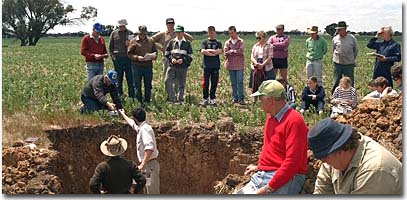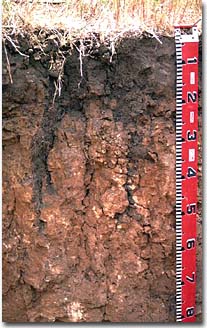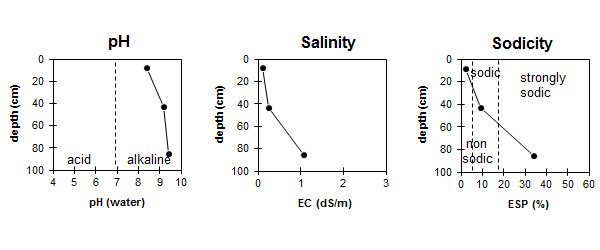Site LS11a
Location: Propodollah
Australian Soil Classification: Calcic, Subnatric, Brown SODOSOL
Northcote Factual Key: Dy 2.13
Great Soil Group: solonetz
General Landscape Description: Lower slope of a low rise on a gently undulating plain.
 LS11a Landscape |
Soil Profile Morphology:
Surface Soil
| A1 | 0-15 cm | Dark yellowish brown (10YR3/3); sandy clay loam; weakly structured; pH 8.4; sharp and irregular change to: |  LS11a Profile |
| Subsoil | |||
| B21k | 15-70 cm | Strong brown (7.5YR5/8); heavy clay; strong coarse prismatic structure; contains a common (20 %) amount of soft carbonate; pH 9.2: | |
| B22k | 70-100 cm | Yellowish brown (10YR5/5); heavy clay; contains few (5-10%) soft carbonate segregations, as well as occasional hard ironstone nodules; pH 9.4. |
- Strong texture contrast between sandy clay loam surface horizon and heavy clay subsoil.
- Hardsetting nature of surface horizon.
pH | Salinity | |||
Surface (A1 horizon) | Moderately Alkaline | Low | Non-Sodic | Slaking, no Dispersion |
Subsoil (B21 horizon) | Very Strongly Alkaline | Low | Sodic | None1 |
Deeper Subsoil (at 1 metre) | Very Strongly Alkaline | High | Strongly Sodic | Complete |

| The surface soil is moderately alkaline. The subsoil is very strongly alkaline throughout. | The salinity rating is low in the surface and the upper subsoil becoming high with depth. | The surface is non-sodic. The subsoil is sodic becoming strongly sodic with depth. |
Management Considerations:
Surface (A) Horizon
- The surface horizon does not disperse but does slake upon rapid wetting which can cause surface sealing. Maintaining adequate surface cover and organic matter will reduce slaking. Dispersion may occur if soil is cultivated when wet (as indicated by moderate dispersion after remoulding). This would result in a reduction of surface soil structural conditions which would restrict seedling emergence and reduce water infiltration.
- The surface soil has a moderate inherent fertility (based on the sum of the exchangeable basic cations).
- The subsoil is very strongly alkaline from 15 cm depth which indicates that nutrients such as iron, manganese, copper and zinc may be poorly available to plants.
- The top of the subsoil is sodic but does not disperse (unless mechanically disturbed in a moist condition). The deeper subsoil is strongly sodic and dispersive and will restrict water and root movement.
- Salinity becomes high in the deeper subsoil and is also likely to restrict root development at depths greater than 40 cm.
- No gypsum is required as it is considered well drained.
- Nitrogen applied.


